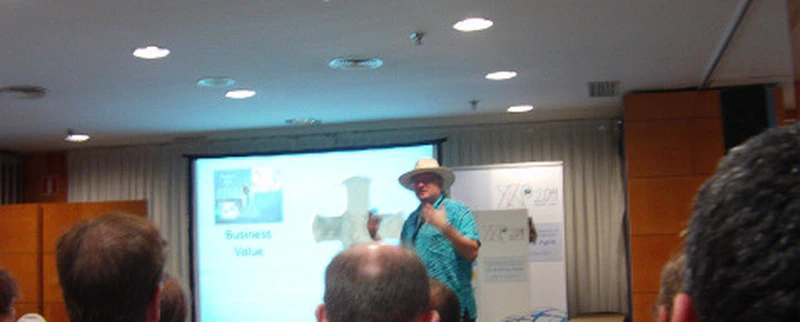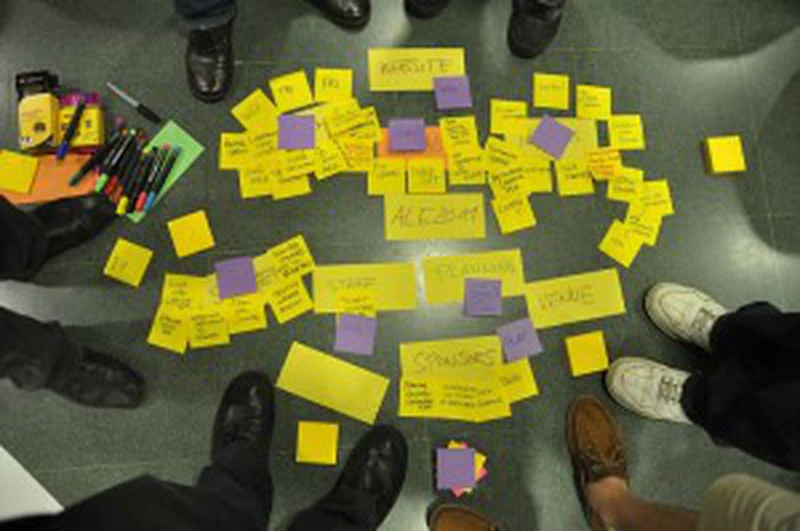After a recap of May 11, I’m returning to this second day of the conference at XP2011 Madrid, May 12, 2011.

This second day started with the keynote from Brian Marick (signatory of the agile manifesto). And so, how can I say, it was very good. Very politically engaged. That’s generally what I will *personally* take away from these two keynotes. A marked political engagement, even if Esther Derby with her needles and her knitting in the hotel lobby didn’t seem particularly subversive. For Brian Marick it’s more obvious, he strongly defends certain concepts and thinkers on anarchism, he mocks Bush, explains the clash between the company and agility and talks about colonization. Or how agile must resist the colonization of the company.
Several key concepts in his speech: a gift economy (gift economy), that is, relationships based on giving. As a product owner I give you certain things, a certain freedom, and in exchange I know that you will also give me certain things. This relationship being far more social than the current negotiation/transactional aspects. This *personally* makes me think of a little book I’ve talked about previously on karmic management. Then a stance of reaction (stance of reaction): for this he made us all dance the Argentine tango and taught us that in this dance the partner doesn’t know what the next step of the leader will be. They must be ready, predisposed to react. Here is Marick’s article on this subject. (Ralph it was a pleasure to dance with you). Finally as I was saying quite a bit of reflection on questions of anthropology that he connects to anarchist movements of resistance to order, to colonization (Marick could be a character from Brazil).
To finish, Marick reminds us that when agile appeared people found it strange, weird (weird). And that it was probably a good sign, that we must keep agile weird (for him it’s a guarantee of its resistance to the established order, that’s how I interpret it). This keynote from Marick was the great moment of XP2011 apparently (although I was bothered by all the religious crosses that adorned his slides too often… my anarchist side perhaps). Another anecdote that should be mentioned I think: Marick explains after signing the manifesto that he’s going to try to apply these ideas in a (real, actual) company, but that the resistance is enormous and that therefore a) either you are crushed and you fit into the mold more or less, b) or you flee to work in an isolated corner, alone, peacefully. It’s choice B that Marick followed if I understood correctly.
So I continued the day by following Marick. Mistake! I fell into a trap of XP techies thirsty for code, an impromptu discussion on tests. A very interesting subject nonetheless but which there turned into an open discussion that wasn’t structured enough. Some interesting information despite everything: I am *really* no longer a dev/IT; all types of tests are often poorly named: unit, integration, acceptance, are complicated words and traps for applying them in everyday life. I quite agree with this feedback, I often have quite a bit of trouble with this terminology. Finally, theoretical best practice often remains wishful thinking: to all the people in Marick’s session he asks: when there is an error what are we going to look at first: the test or the code, well the vast majority look at the code… (including Marick).
Other highlights still in my day: a session by Elizabeth Keogh on BDD. Interesting this way of treating problems more radically (that is to say at the source) and highlighting the underlying objectives (subgoals). (I also note my pleasure in observing that women have an important part in this XP2011 with the presence and interventions of Elisabeth Keogh, Esther Derby, Kati Vikki, Mary Poppendieck).
I played the Last responsible moment game with Olaf Lewitz!

And then big deal we talked about ALE and the organization of this first conference in Berlin in September. The dynamism and optimism of Olaf Lewitz sweeps everything in its path and translates into real efficiency. Worth pondering. The next session: at the bar, with Jurgen Appelo, Ken Power, Michael Leber, Marc Clemens and Julian ?? allowed us to discuss the organization of ALE further and how to organize a network of this type without governance in “command & control” mode. Despite the apparent but comical animosity of the waiter, the bar remains a safe bet for discussions and ideas (unless the size of the group was particularly suited to it…?).
To finish, my XP 2011 ended at the restaurant with Jurgen Appelo, Marc Clemens, Ken Power, André Dhondt, Michael Leber, Olaf Lewitz and one or two other people whose names I can no longer remember. It was very nice and overall participating in a conference where everyone is open and friendly is in itself a beautiful thing (which I would find again at sudweb a few weeks later).
Be careful however when Olaf Lewitz grabs you in his enormous arms to tell you “see you soon” you need to remember to take a good breath beforehand.